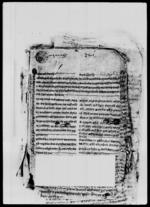A decree of King Jayaprakāśa Malla prohibiting certain activities in various shrines of Kathmandu (NS 872)
ID: PN_0008_0020
Edited and
translated by Bal Gopal Shrestha, Ramhari Timalsina and Manik Bajracharya
Created: 2017-04-23;
Last modified: 2018-10-16
For the metadata of the document, click here
The accompanying edition, translation/synopsis and/or commentary are available under the terms of the Creative Commons Attribution-ShareAlike 4.0 International License
Abstract
This is a decree of King Jayaprakāśa Malla forbidding activities in various shrines of the Kathmandu Valley, such as cutting down trees, killing certain wild animals, and disturbing Brahmins and visitors from outside the Valley.Diplomatic edition
[1r]
1श्री\ 1पुस्तकषानामार्फत1नं१०१[unknown seal][seal of Siddhiharṣa Vajrācārya][seal of Siddhiharṣa Vajrācārya][seal of Siddhiharṣa Vajrācārya][seal of Siddhiharṣa Vajrācārya][seal of Siddhiharṣa Vajrācārya]1सकलताडपत्रवमोजिम्उल्थागरेकोदुरुस्तभनिसहिछापगर्नेपंसिद्धिहर्षवज्राचार्य्य2असन्तछेवाहाल¯¯¯¯¯¯¯¯¯¯¯¯¯1थ्वतियाधर्म्मार्थयासाक्षि ।।¯¯¯¯¯¯¯¯¯¯¯¯¯1योधर्मार्थकोसाछि¯¯¯¯¯¯¯¯¯¯¯¯¯
2स्वस्तिश्रीपशुपतिश्री३स्वयंभुचैत्यश्री३तलेजुमाजुश्री३देवगुतलेश्री३वज्रयागिनीश्री३चगुनारायणश्री३गोकर्ण
3स्वस्ति।।श्रीमत्पशुपितचरणकमलधुलिधूसरितशिरोरूहश्रीमन्मानेश्वरीष्टदेवतावरलब्धप्रसाददेदीप्यामानमानोन्न
4तश्रीरघुवंशावताररविकुलतिलकहनुमध्वजनेपालेश्र्वरमहाराजाधिराजराजराजेन्द्रसकलराजचक्राधीश्वरनि
5जेष्टदेवदेवेश्वरीकृपाकटाक्षवलितविक्रमोपार्जितवारणाकरसमुद्भुतगजेन्दपतिश्रीश्रीजयप्रकाशमल्लपरमभ
6ट्टारकदेवानांसदासमरविजयिनाम्¯¯¯¯¯¯¯¯¯¯¯¯¯
7प्रभुथाकुरसनओश्रीश्रीराजोपाध्यापरमानउमराओ
8भोटयोगिदेशान्तरिमहाविद्याधरपञ्चसकलेंसाहुति
9मतयाङाओआओनलिञदेशससुनानंअन्याओयाय
10मदुसयभूचैत्ययागरवालावुगरगोकर्णगरचंगुगरव
11ज्रयोगिनीयागर।।थ्वतिदेवयास्थानयासिमागरसुनानं
12सिछकाखुनुछाङांओकायमदु।।साव्राम्हंअतितपनि
13स्तदुःखवियेमदुध्वरमाकरवि⟪सुनानं⟫स्यायेमदुखेलवन
14खण्डगनंमितयेमदु।।थनमृगस्थलीयासिंहरसुद्दा
15सुनानंकायमदु¯¯¯¯¯¯¯¯¯¯¯¯¯
16थ्वपतिसचोक्वनउपरसुनानंयातसापंचमहापापराक
17जुलोग्वम्हसेनंमानयेयातओम्हपरमेश्वरयासुदृष्टिराज
18दंदमोहा३२थ्वतिजुरोसम्वत्८७२आषाढशुद्दि१संक्रा
19न्तिवुधवारकुन्हुशुभम्¯¯¯¯¯¯¯¯¯¯¯¯¯
7प्रभुथाकुरबाटरश्रीश्रीराजोपाध्यापरमानउमराओ
8भोटदेशान्तरिथुलोविद्वान्पंचहरुसवैसल्हा
9गरेरअवउप्रान्तकाडमाडौमाकसैलेअन्यायन
10गर्नुसिंवुचैत्यकावनमावालावुवनमागोकर्णवनमा
11चांगुवनमावज्रयागिनीकावनमायतिदेव
12कोरुखरवनमाकसैलेदाउराएककाट⟪पनिकाट⟫काट
13नुगाइव्राह्मणअतितहरूलाईदुःखनदिनुस्यालवा
14दरसर्पकसैलेनमार्नुचौरमावनमाकहिपनिआ
15गोनलाउनुयाहामृगस्थलिकोस्यावलासुद्दाकसै
16लेनलिनु¯¯¯¯¯¯¯¯¯¯¯¯¯
17योपत्रमालेखेकाउपरकसैलेगर्योभनेपंचमहापा
18तकलाग्छकसैलेमानेरगर्योभनेत्योपरमेश्र्वर
19कोसुदृष्टिराजदंदमोहर३२नेपालीसम्वत्८७२आषा
20ढशुदि१संक्रातिवुधवारकादिनशुभम्¯¯¯¯¯¯¯¯¯¯¯¯¯
Synopsis
The content of this document is similar to that of a copperplate located in Pashupati Devapattana (see PN_0004_0049). The present document, though, provides a parallel translation from the Newari original (left column) into Nepali (right column). The translation of the document was attested as to its accuracy by Siddhiharṣa Vajrācārya of Asan.
This decree instructs people not to cut down trees or lop off branches in the forests of Svayambhū, Bālābu, Gokarṇa, Cāṃgu or Vajrayoginī, not to trouble cows, Brahmins or visitors, and not to kill jackals, monkeys or serpents. Furthermore, it prohibits people from setting fires on open grounds there or in surrounding forests, and from collecting even a single piece of wood. In the case of Mṛgasthalī, it directs that even fallen leaves are not to be gathered. At the end, it warns against ignoring the decree and committing one or the other of the five great sins, while the assurance is pronounced that Parameśvara (Almighty God) will look favourably upon those who obey. A royal fine of 32 moharas awaits offenders.
A major part of the present document is similar to a copperplate of King Jayaprakāśa Malla’s affixed to the front wall of the temple of Vajrayoginī and bearing the date budhabār 1 śuddi āṣāḍha saṃkrānti NS 872 (1752 CE) (see Regmi 1966: 304-5, Shrestha 2012: 394). One difference is that the copper inscription at Vajrayoginī does not contain the special order concerning Mṛgasthalī. Another similar copper inscription at Vajrayoginī, dated NS 849 (1729 CE), prohibits people from cutting down trees and carrying the wood to sell in Bhaktapur (Regmi 1966: 286).

